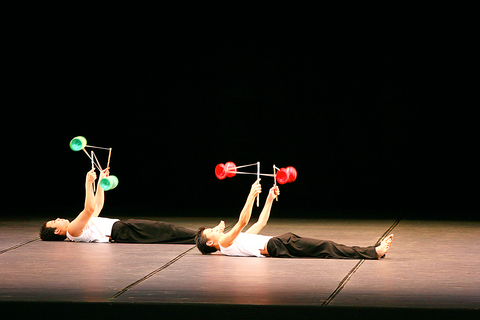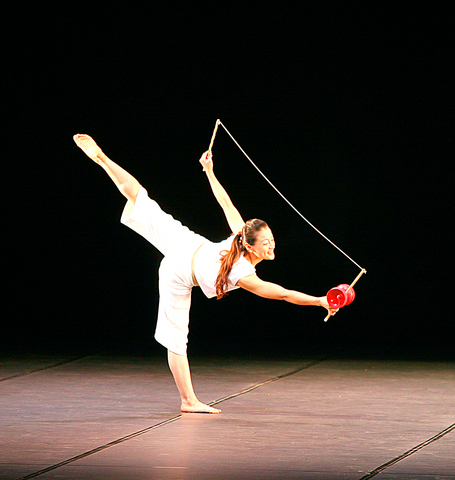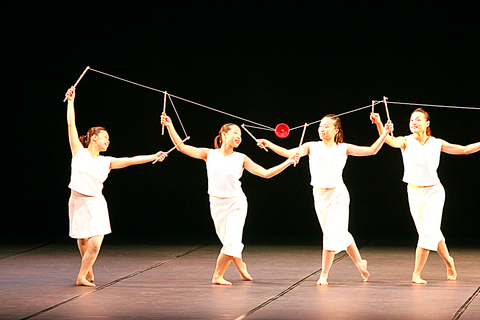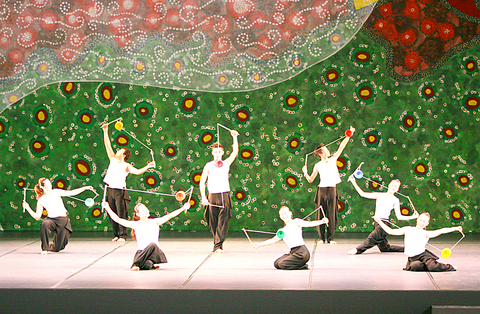Diabolo Dance Theater (
Diabolo, which comes from the Greek dia (across) and bale (throw) doesn't give you much idea of the actual object or its history. The diabolo is a toy that was invented 4,000 years ago in China where it was called "hollow bamboo" (
English and French travelers to China took the toy back home to Europe with them around 1800, where it was given the name of diabolo. The game gained popularity in the 19th century among aristocrats, who played it like tennis with elegant poses and in dainty white outfits. The object itself underwent a few changes and the hourglass shape emerged (a form that would later gain popularity in China and Taiwan).

Chinese Nationalist Party (KMT) members brought diabolos -- the old bamboo kind -- to Taiwan in the late 1940s. The game found its way into public schools as part of the physical education for elementary students.
"In Taiwan, many people can do it but only a little bit," said Diabolo Dance Theater's artistic director Liu Le-chun (
Liu's idea for a diabolo dance group was born out of a passion for fun. Years ago as an elementary school teacher, Liu's favorite part of the day was the afternoon PE class when he would teach his students to play with the diabolo. The kids got quite good at it, but Liu noticed their movements were quick and tense. He wondered if there was a way to turn playing with the diabolo into a more graceful form of movement, like dance. Pretty soon a club had formed with musicians, dancers and many enthusiastic students.

"At first it was just for fun and we didn't know what it would become ? The most unexpected thing was that the kids themselves wanted to keep up with diabolo."
In 1993, Diabolo Dance Theater was officially founded and Liu left his teaching post to lead the group full time. Until recently, Diabolo has remained relatively low profile in the world of performing arts.
The performers are almost all high school students -- only a handful are salaried performers. While a majority of Taiwan's more prominent dance or acrobatics troupe members have received full-time education in these disciplines, Diabolo's dancers study accounting or other such non-artistic subjects.

"We've surprised many a performing arts professional. They ask, `Who are these people and how did they suddenly appear on the scene?'" Liu said.
Despite little recognition, Diabolo Dance Theater has consistently produced high-caliber performances that bring creativity to the ancient game of diabolo.
According to Liu, the tradition of diabolo performance is strict and formal, with rules about costume, music, makeup and movement that are in line with the tradition of Chinese opera and acrobatics.

Diabolo Dance Theater is a departure from tradition in that it uses a wide variety of costumes, music, movement, lighting and props. For example, their performances have incorporated dramatic lighting aspects such as lasers, black light and huge shadows; costumes that range from fantastical clown outfits to roller skates; and music that is a bit more familiar and fun for a modern audience.
The hard work and creativity has paid off. In 2002, Diabolo Dance Theater was invited to perform at New York's Lincoln Center and last month it went to Aichi World Expo with a delegation of five Taiwanese groups that included Lin Hwai-min's (
The performance will differ most obviously from Diabolo's past performances in the use of classical music -- Wolfgang Amadeus Mozart and Franz Schubert, among others.
"We had never used [classical music] before because its elements are so fine and subtle, unlike more modern music where the rhythm is easier to hear," Liu said.
The idea is that subtler music will help to accent the diabolo dancers' movements, which will be slower and more elegant than in past performances, Liu said. "We thought about why, in its simplest form, is the diabolo appealing, and we started from there."
The performance consists of six "games," each with a different season as its theme, starting with summer and ending with spring. As the seasons progress, the games transform from being carefree childish sports to teenage romance.
According to Liu, this progression represents the length of time that many members stay with the group -- from elementary school, through high school and even college.
"This kind of performance is quite rare. Even in the circus, nobody spends 70 minutes on just the diabolo. So our challenge is how to use such a simple thing as the diabolo to entertain an audience for 70 minutes," Liu said.
Clearly, they have succeeded. As of press time there were less than 100 tickets remaining unsold for each performance.
Performance notes:
What: The Game of Diabolo Dance
Where: National Theater 21-1 Zhongshan S Rd, Taipei
When: Tonight and tomorrow at 7:30pm, Sunday at 2:30pm
Tickets: NT$350 to NT$1,200, available through Artsticket outlets, (02) 3393 9888 or www.artsticket.com.tw

William Liu (劉家君) moved to Kaohsiung from Nantou to live with his boyfriend Reg Hong (洪嘉佑). “In Nantou, people do not support gay rights at all and never even talk about it. Living here made me optimistic and made me realize how much I can express myself,” Liu tells the Taipei Times. Hong and his friend Cony Hsieh (謝昀希) are both active in several LGBT groups and organizations in Kaohsiung. They were among the people behind the city’s 16th Pride event in November last year, which gathered over 35,000 people. Along with others, they clearly see Kaohsiung as the nexus of LGBT rights.

Dissident artist Ai Weiwei’s (艾未未) famous return to the People’s Republic of China (PRC) has been overshadowed by the astonishing news of the latest arrests of senior military figures for “corruption,” but it is an interesting piece of news in its own right, though more for what Ai does not understand than for what he does. Ai simply lacks the reflective understanding that the loneliness and isolation he imagines are “European” are simply the joys of life as an expat. That goes both ways: “I love Taiwan!” say many still wet-behind-the-ears expats here, not realizing what they love is being an

In the American west, “it is said, water flows upwards towards money,” wrote Marc Reisner in one of the most compelling books on public policy ever written, Cadillac Desert. As Americans failed to overcome the West’s water scarcity with hard work and private capital, the Federal government came to the rescue. As Reisner describes: “the American West quietly became the first and most durable example of the modern welfare state.” In Taiwan, the money toward which water flows upwards is the high tech industry, particularly the chip powerhouse Taiwan Semiconductor Manufacturing Co (TSMC, 台積電). Typically articles on TSMC’s water demand

Every now and then, even hardcore hikers like to sleep in, leave the heavy gear at home and just enjoy a relaxed half-day stroll in the mountains: no cold, no steep uphills, no pressure to walk a certain distance in a day. In the winter, the mild climate and lower elevations of the forests in Taiwan’s far south offer a number of easy escapes like this. A prime example is the river above Mudan Reservoir (牡丹水庫): with shallow water, gentle current, abundant wildlife and a complete lack of tourists, this walk is accessible to nearly everyone but still feels quite remote.